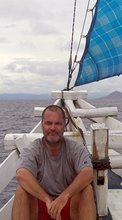
The Spirits of Bukit Lawang
At first cock-crow the ghosts must go
Back to their quiet graves below.
--Theodosia Garrison
NORTH SUMATRA – The spirits have been silent since the water swept through three years ago. “The flood changed the river. It changed everything,” says 30-year-old male trekking guide, Umbrella.
Reminders to that November 2003 night, in which perhaps 400 people were killed, abound in Bukit Lawang. Tombstone-white cement foundations, remnants of washed-away huts, dot the Bohorok’s east bank. An inappropriate pollen-yellow excavator labors downstream from where I stand, its dinosaur movements biting wide the river banks. An entire neighborhood of cement block houses climbs up over a hill to the river’s southeast, reportedly a consolation gift from the government for those left behind. And, of course, the spirits do not say much anymore either.
Standing at the riverside, looking out over these worn foundations, testaments to what once was, it is hard not to imagine how glorious it must have been to be staying in one of those rooms perched at the border of North Sumatra’s wilderness. The west bank that marks the entrance to the Gunung Leuser National Park is made up of boulders and smaller rocks. The jungle mountains rise directly from this bank, presenting a lacework so intertwined, that individual trees are as hard to discern as a single thread is in a finely-made ship cloth.
This must have made for the most beautiful of jungle settings from which to sit on your porch and watch the orangutans swing their heavy burgundy potbellied bodies from tree to tree on the river’s other side. The river was narrow, the apes were close, and all was as it should have been. It must have been the kind of place that someone would fly half way around the world to experience.
With generator-provided electricity available only a few hours daily, Bukit Lawang is in the realm of a heavy darkness that city-dwellers have evolved away from. A blackness so complete, your hand waves unseen in front of your face. So total, that a torch is needed to fumble your way to the bathroom at night.
And so all-encompassing, that when a flashflood crushes the rattan walls of your room upon your sleeping body, you will have no idea of where to flee and you will be wrenched by the river’s muddy grasp into the water, uncomprehending, and you will scream out to those dying and screaming their own fruitless prayers around you, hoping that they might perhaps be noble enough to forego their own tragedies in order to come to your aid. Your lungs will be pressed full of mud, your warmth extinguished by its vacuum-filling solid coldness as your life is squeezed from you, gasp-by-gasp, and still your body, unseeing, unfeeling and unknowing, will continue on its macabre parade downriver continuously recruiting new followers along the way.
If your family is fortunate, your body will be found, its limbs stuck in odd, driftwood-like, poses. Pulled from the mud like a fossil, it will be tossed into the back of a palm-tree-plantation truck and brought home and buried and loved.
At the end of 2003, many were not so lucky.
Umbrella says he knew evil was drawing closer. He says that in the months leading to that night, the spirits of the jungle and the spirits of the river came and warned the people. Every night, for two months, the black ghost bird visited the Jungle Inn. This inn, the last accommodation available before the national park, lost a row of rooms that night.
“The ghost bird,” Umbrella softly says, while looking at the Bohorok from the Jungle Inn’s restaurant, “perched on the railing there and cried out its warning caw. Also, a midnight cock crowed its ‘cock-a-doodle-dooo’ in the middle of each night for a month.”
“A week before the flood, the spirits grew more desperate,” says Umbrella, his right hand tapping a cigarette against the table. “They came inside people sitting here and said through those people, ‘Go away. The river is coming.’ They tried to tell us, but many did not listen.”
“I saw and talked to the people with the spirits inside them. I heard the midnight cock and the ghost bird. I knew. My sister sold drinks to tourists at the side of the river. I told her, ‘Do not think of the money. Think of the strength of the river.’ She didn’t listen. She was in her house that night, at the river’s edge, and I lost my sister, niece, and nephew,” his moistening eyes focus on his smoke.
For the survivors, the demands of life were not washed away. Jobs must be had and livelihoods secured. Umbrella, now only guiding trekkers part time, farms oranges 20 minutes from Bukit Lawang. The Jungle Inn has added rooms at higher elevations than before. A new motorcycle bridge is nearly finished and the river is broader in the hope that it is now less potent.
My nine-year-old daughter and I sit in the Jungle Inn’s restaurant watching a family of macaque monkeys walking on all fours foraging among the rocks on the opposing shore. We are on a daddy-daughter journey and have just walked back upstream following a one kilometer river run on inner tubes. Our wet clothes suction tight against our bodies while bold drops of river water pattern the cement floor.
Going through the menu we agree to share a lemon pancake and order a pair of the inn’s signature drink, Jungle Inn Tea. Made with cinnamon, cardamom, red stick, bay leaf, ginger, lemon grass, Chinese akar root, nutmeg, star anise, lemon, and sweetened with honey, the drink is served in a tall clear glass chocked full of leaves, roots, and other plant odds and ends.
While I cannot vouch for the menu’s claim that the mixed herbal tea is “Good for Malaria, Blood Stimulation, Slimming, [and] many other properties,” it is the perfect beverage for us this late afternoon while our clothes dry, steaming upon us.
Asa, the inn’s genie-bellied shirtless keeper, brings our sugar-dusted thin pancake. The plate is lowered.
“How was the river?” he enquires in Indonesian, his chestnut nipples staring into my eyes.
“Great. Not as cold as our mountain rivers.”
“Where you from?”
“Canada,” I lie, veiling my red, white, and blue vein.
“Pretty cold there. How long you going to stay?”
“Probably two more nights. We want to catch the feeding tomorrow morning.”
“This morning they didn’t take anyone across. Said the water was too high for the canoe,” he says, motioning with his rounded teak chin towards the tethered single-log craft.
“Does that happen much?” I ask, lifting my glass to my mouth, deftly pushing the mix-herbed foliage out of my face with an index finger. Surely the locals are impressed with my one-handed abilities.
“No. I think the feeders were just lazy this morning.”
“The river seems fine now,” I say. “It was shallow enough for me to stand in.”
“Yeah. It actually looks rougher than it is.”
“That’s good. Do people ever get caught up in the rapids? Or drown?”
“A few times. Medan people come and fall in. If a spirit gets inside them, they will die unless their clothes are given to the river.”
“Give their clothes?” I ask.
“When they are pulled from the water, their shirt or pants or something must be sacrificed. Otherwise, the spirits will not leave them and the people won’t wake up.”
The next morning’s feeding does not go as advertised in Lonely Planet. We are roped across the river in the canoe with our shoes held high. We clamber up into the greenery following a well-traveled path to ascend 20 minutes to a two-by-three meter elevated platform. On the platform the feeder bangs two pieces of wood together, calling the apes. They do not come. We hear gibbons calling, “woo, woo, woo,” from somewhere we are not.
We sit and we linger just to the side and below the platform. The feeder bangs, bangs, bangs his wood. The meal of bananas waits at his feet. Insects collect on my ankles, each one of my pores rush to push out beads of sweat. I take a photo of my daughter, even sweaty she is cute, and begin to turn over rocks, rotting wood, and fallen leaves hoping to uncover a lizard or snake or anything like those khaki-clad folks on TV do. Nothing. Bang, bang, bang.
After an hour, our simian dreams unfulfilled, we start back down the path with the feeder leading the way. Half way along we turn the corner and there, the feeder points, five meters downhill, not on the path but through the foliaged-thickness, is a large orangutan nonchalantly brachiating her way up. She reaches from limb to limb with arms twice the length of her body. I close my eyes and concentrate trying to listen for her movement through the jungle. I cannot. To my 39-year-old Jakarta-seasoned ears, she is as silent as an unfolding fern.
Once she reaches the path, she lowers her tubby self to the ground and ambles across the clearing like a George Lucas character and, in a single unhurried movement, hauls herself into a tree. She hangs out horizontally, to the side, using just her left limbs and, with her right foot, takes the bananas from the feeder. She hangs like that, seemingly posing for photos, for many minutes. It is magical to be so close to a semi-wild animal that possesses such grace and power and is, according to molecular biologists, genetically, 96.4 percent identical to us.
Just two meters in front of this female, her eyes swinging into ours, I understand why these animals embody mystical beings to many indigenous peoples in Sumatra and Borneo.
The peaceful nature of these orangutans, Asia’s lone great ape, belies their tragic tales. As infants, many were stolen from the cooling grasps of their murdered mothers by poachers who then sold them to the best and the brightest of South East Asia’s upper class. It is from their homes, that the apes were rescued and reintroduced into the wild.
A young orangutan normally stays with its mother seven years and, therefore, teaching one to thrive as it was designed to live is a protracted process. Though the rehabilitation center is no longer open, the feedings still take place, with only a mundane diet of milk and bananas being offered. These feedings raise awareness and bring cash into the area.
Visitors are told not to touch nor feed the apes. With the orangutan’s DNA being so similar to ours, diseases nimbly jump from our population into theirs. Estimates are that since 1990, 80 percent of the wild-born babies in the Bukit Lawang area have been killed by either disease or malnutrition. We resist all temptations and depart with only photos.
My daughter and I have traveled by plane, bus, motorized trishaw, and foot to make it to Bukit Lawang. We came to experience the jungle, its wildlife, and tube its river. Our expectations realized, we are truly thankful and we both know there remains but a single task.
While packing the next morning, I hand my blue button-up Tommy Hilfiger shirt, a gift from my mother in America, to my daughter and we walk hand-in-hand to the Bohorok. Carefully we pass our way over the river rocks. It is awkward going.
Once at the river’s edge, we squat down, I like a middle-aged western man, my daughter like the young Asian she is. Using both hands she silently folds the material into halves, quarters, eighths.
I leave it to her to say the prayer and she does so in Arabic before reaching out and floating the rectangle onto the river’s surface.
Strong and flat, the offering twists away from the side. The cloth raft, rotating in the current, picks up speed and suddenly, tiny chocolate tendrils inch up, accept the gift and pop it beneath the surface.




